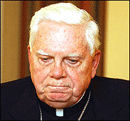- Title Page
- Introduction
- Boston Globe —Brief History
- Baron—A New Face
- An Investigation is Born
- The Spotlight Team
- The National Picture
- The "Most Catholic City"
- Cardinal Law
- The Paper and the Cardinal
- The Globe and Boston's Catholics
- Father Geoghan Case
- Starting to Dig
- Organizing the Files
- The Database Grows
- When the Story Gets Personal
- Reporting Your Culture
- Potential Backlash
- Rezendes Gets a Scoop
- Publish or Pause?
Cardinal Law

Cardinal Bernard Law
©
The Boston Globe
In 1984, Bishop Bernard Law became Boston’s archbishop. He succeeded Cardinal Humberto Medeiros, who had alienated the Catholic rank-and-file by supporting busing to forcibly integrate public schools. Unlike O’Connell and Cushing, both Irish Catholics from Massachusetts, the Portuguese-born Medeiros wasn’t a hero in blue-collar communities.
Law, by contrast, “charmed Church leaders and thrilled the laity during an inaugural week of hope and celebration,” the Globe wrote. [1] Some found the charismatic Irish Catholic with ties to Boston—he had graduated from Harvard—even more impressive than the legendary Cardinal Cushing. Paul White, longtime editor of the Archdiocese newspaper, wrote that “[b]oth are forceful, but I see in Archbishop Law the charm and personality and clarity and openness I didn’t see in Cardinal Cushing.” [2] In 1985, Law traveled to Rome to be elevated to the rank of cardinal. This was a relatively good time for the church, with a young and powerful pope at the helm. The optimism pervading the church was evident in Law’s statement during his swearing-in ceremony: "This is the strongest moment for the church since the Reformation." [3]
Law was known for rigid adherence to church teachings and for traditionalism on social issues like abortion, which he called the “primordial darkness of our time.” He made national headlines when he forbade a girl with a wheat allergy from using a rice cracker during communion. He and fellow traditionalist Cardinal John Joseph O’Connor of New York (also appointed in 1984) were nicknamed “Law and Order.”
Ambitious, at ease in South Boston as well as Rome, conservative in a conservative time, Law became a national leader. He befriended President George H.W. Bush, with whom he spoke monthly, and his chief of staff, John Sununu, with whom Law met weekly. His power was such that he was sometimes mentioned as a possible successor to Pope John Paul II, but the papacy, said the Globe , was unlikely to be bestowed on an American, especially one so close to a president: “If we choose Pope Bernard, his critics might say, nobody would know whether he was speaking for the church or the Republican Party.” [4]
While his relations with such national figures were strong, Cardinal Law did not have as cordial a relationship with the Globe .
[1] The Investigative Staff of the Boston Globe, Betrayal (Little Brown, 2002), p.33.
[2] The Investigative Staff of the Boston Globe, Betrayal , p.34.
[3] Jack Thomas, “Crisis in the Church; Scandal Darkens a Bright Career,” Boston Globe , April 14, 2002.
[4] Daniel Golden, “The Cardinal’s Ambitions; Does Cardinal Bernard Law Serve the Pope or the President? Is He Prelate or Politician—or Both?” Boston Globe , April 22, 1990.